The Last Ride Of The Dalton Gang
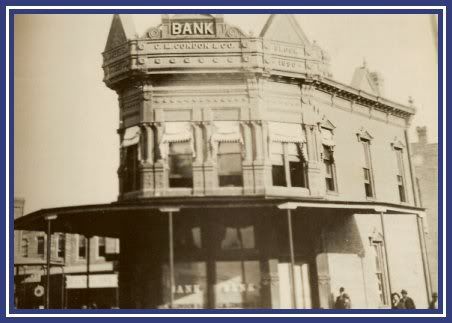
Condon Bank in 1892
It was Wednesday, October 5, 1892, when five men broke up their dry camp on Onion Creek, saddle their horses, crossed a plowed field and headed for the town of Coffeyville, Kansas. They were The Dalton Gang making their final ride into history.
The bandits stuck close together as they entered the town, riding in two groups. The Dalton brother, Bob, the leader, Grat, the oldest and Emmett the youngest, were side by side in front. Behind them rode Dick Broadwell and Bill Powers.
Their plans were to rob two banks at once. The Condon Bank and the First National Bank of Coffeyville. This was the first for the Daltons in the bank robbing business. For the last 18 months, their bandit career consisted of only 5 train robberies in the Oklahoma Territory.
As the reached the downtown plaza area, the streets were full of parked rigs and horses. The stores were full of people, and had been that way since eight o'clock. An ordinary day in Coffeyville.
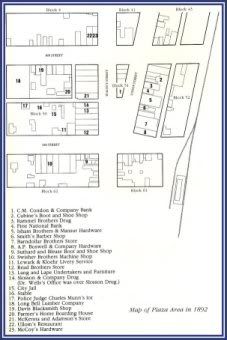
Map of Plaza Area in 1892
(click to enlarge) |
|
On the corner of Walnut and 8th Street the gang discovered their first setback. Their plans were to hitch their horses on the corner, but the street was torn up with road construction for the purpose of curb and guttering. So their plans were changed to retreat back up 8th Street, turn south on Maple, to an alley where they tied their horses and dismounted, and walked west to Walnut. |
It happened on that morning that Aleck McKenna was sweeping the sidewalk in front of his business. He clearly saw the Daltons leave the alley and walk into the plaza. He watched as Grat, Bill Powers and Dick Broadwell split away from the other two and entered the Condon Bank. Bob and Emmett walked across the street and entered the First National Bank. When he saw a Winchester leveled at the Condon's employees, McKenna instantly began to spread the alarm.
The citizens hurried to Boswell's and Isham Brothers Hardware stores, where clerks began to hand out Winchesters, revolvers and shotguns to anybody who wanted a weapon. There were a large number of volunteers who turned out. Ammunition was broken out and the men of Coffeyville loaded their weapons and took up positions to meet the threat to the peace of the city.
Inside the Condon Bank, Grat, Bill Powers and Dick Broadwell were unaware of the army forming. They had entered the bank by a door on the southwest corner. Powers and Broadwell took a position by the doors as Grat leveled a Winchester into the face of teller Charley Carpenter. Grat moved quickly behind the bank counter, and tossed a two bushel grain sack to Ball, the cashier, ordering him to hold the sack open as Carpenter filled it with all the money in the cash drawers.
The outer door to the vault was open, and Grat discovered three bags of silver dollars. He ordered these to be dumped into the grain sack along with the currency. When ordered to open the door to the vault, cashier Ball shook his head, saying that it was on a time lock set for 9:30 a.m. Grat asked what time it was then , Ball looking at his watch, said, "9:30 a.m" If Grat had only look at the main clock in the bank which read 9:40, he would have know that Ball was lying. But he decided to wait.
Over at the First National Bank, Bob and Emmett had barged in with cocked Winchesters. Emmett stayed in the front of the bank to cover the cashiers and tellers as Bob strolled down the hall into the bank and ordered Bert Ayres up to the vault.
Ayres scraped together what money there was on the counter and in the cash drawer, putting it into a grain sack that Emmett produced. He then went to the vault and returned with it's contents. Emmett's sack was stuffed with more than $20,000 of the First National Bank's money. They had made a good haul without firing a single shot. As Bob and Emmett cleared the doorway of the bank, herding the employees before them, when the citizens cut loose with their rifles, forcing them to return to the interior of the bank. Some of the Coffeyville defenders concentrated their fire on the First National Bank while others began pouring lead into the lobby of the Condon Bank.
Bob Dalton realized that there was nothing but death waiting for him and Emmett out the front door of the bank, decided to retreat out the back, hiding behind teller W.H. Shepherd. There they found their first bout with trouble, as coming down the alley was Lucius Baldwin, the clerk from Read Brothers. He moved towards them with a revolver. Both Daltons covered him with their rifles and told him to stop. Baldwin didn't react at all, and was shot down by Bob Dalton. After the shooting, the outlaws turned north up the alley and turned left into 8th Street, leaving Shepherd to tend to the dying boy.
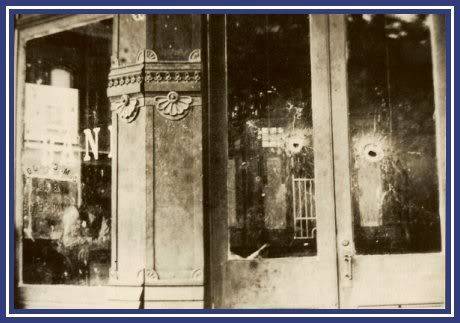
Condon Bank Windows |
|
Back in Condon Bank, bullets smashed through the windows, and slammed into the walls, while customers and bank employees huddled on the floor for safety. Soon Powers and Broadwell were hit by rifle bullets and were down. Grat decided it was time to run for it, going out the southwest door. Grat opened up the grain sack, grabbed the currency, which he stuffed inside his vest, and headed out the door to the alley, into the main fire from the defenders. |
Grat and Powers were hit almost immediately as dust puffed from their clothing as the Winchester slugs tore into their bodies. Both men stayed on their feet, staggering on into the alley and making doggedly for their horses.
As Bob and Emmett came to the corner of Union and 8th Streets, they got a clear view down past the First National Bank, and could hear the roar of firing as the citizens poured bullets into the Condon Bank windows.
Bob opened fire from the north, shooting Boot maker George Cubine. Shoemaker Charles Brown, an old man, and Cubine's work mate, saw him fall. He seized the fallen man's Winchester to return fire at Bob. Four more shots left him lying dead in the street.
Bob and Emmett crossed Union to Walnut to a raised sidewalk on the west side of the street. Turning west on 8th, they headed a half block, turned, and went north down a side alley that led down to the main alley where the horses were hitched.
Grat temporarily found cover in a stairwell, pulled out into the alley, and fired several times without coming close to hitting anyone, turned and tried to reach his horse. At the same time, Marshal Charles T. Connelly stepped into the alley between some fences looking west toward the outlaw's horses. Grat, looking up, saw the Marshal's back turned toward him. Grat fired, and Marshal Connelly lay dead. Grat staggered past Connelly's body, trying again to reach his horse, but John Kloehr shot Grat down, putting a 44-40 bullet through the outlaw's throat. Powers tried to find shelter in a doorway in the alley, but the door was locked. Coming back out into the alley, he was exposed to the Winchester fire, was shot in the back, and he lay dead in the dirt of the alley beside his horse.
Dick Broadwell, badly hurt, managed to reach the horses. As he mounted his horse and turned to run, Kloehr and a man named Seamen opened up on him. He was hit with a rifle bullet, and a load of buckshot. He grabbed the saddle horn and managed to stay amount. Turning his horse he managed to make it to the edge of town where a posse would later find his body laying alongside the road.
Soon Bob and Emmett were in the alley and in full view of the citizens. Running for their horses, Bob was shot and fell over a pile of cobblestones back behind the jail. Emmett remained unhurt until late in the fight. He ran with the grain sack full of the First National Bank money and mounted his horse. He turned to ride out of the alley, but was stopped in his tracks. But Why? Maybe because of brotherly love ... he turned into the citizens fire, and rode back to Bob. When reaching over to pull him into the saddle, Emmett was shot in the back with a shotgun blast from Seamen's shotgun.
Soon, ,there arose a shout from the citizens, "They're all down!" When the outlaws were approached, Emmett was the only one found to have survived. Emmett was taken to Dr. Wells's office, where he had a total of 23 chunks of lead in him, and wasn't expected to live.
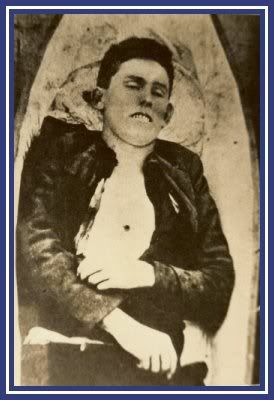
Bob Dalton - Dead |
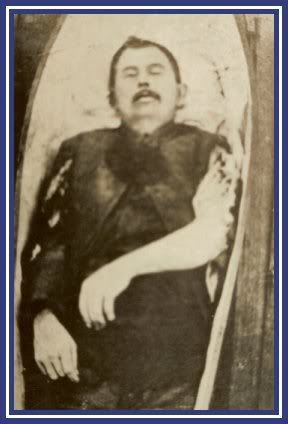
Grat Dalton - Dead |
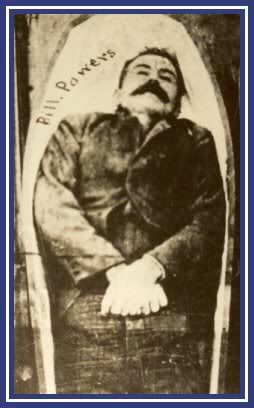
Bill Powers - Dead |
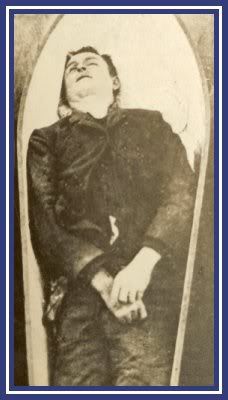
Dick Broadwell - Dead |
Emmett lingered in great pain and would not agree to amputation of his arm as suggested by Dr. Wells. Whether it was God or the skill of Dr. Wells, Emmett began to mend to the point where he was given over to the sheriff.
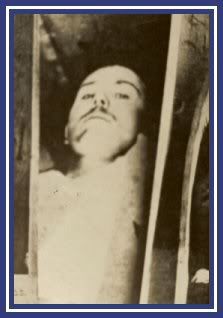
Emmett Dalton - Wounded |
|
In March of 1893, Emmett was brought to trial in Independence, Kansas for the murders of Cubine and Baldwin during the Coffeyville Raid. He pleaded not guilty, insisting that Bob had done all the shooting at the time of the raid. The next day he pleaded guilty to second degree murder and was sentences to spend the rest of his life in Lansing Penitentiary at Lansing, Kansas. |
Emmett was a model prisoner, and in 1907, was granted a 4 month parole to have his old wounds treated in a local hospital. There he was approached by a local reporter. He told the reporter, "I was guilty because I was with the crowd that planned the crime and murdered the citizens. I was with the gang because I loved my brother Bob. I might have gotten away, I think, but I could not bear the thought of leaving him there weltering in his blood. I guess it was a good thing that I was shot and sent to prison, for I have learned my lesson, that is.. Crime doesn't pay!"
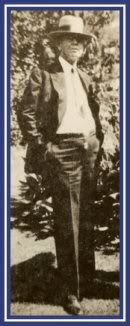
Emmett Dalton in 1930's |
|
Hearing these quotes, the Kansas Governor, in August of the same year, granted Emmett an unconditional pardon. Being a free man, he married Julia Johnson, September 1, 1908, and later wrote two books, "When The Daltons Rode" and "Beyond The Law". |
In the 1930's he returned to the Elmwood Cemetery in Coffeyville to visit the graves of brothers Bob and Grat and of Bill Powers. Standing at the graves with the local reporter Emmett stated these words, "I challenge the world to produce the history of an outlaw who ever got anything out of it except that, (pointing to the graves), or else huddled in a prison cell. The biggest fool on earth in the one who thinks he can beat the law; that crime can be made to pay. it never paid, and it never will, and that's the one big lesson of the Coffeyville Raid."
Emmett and Julia moved to California, and while working in Real Estate, Emmett's health began to decline. In his later years, he found religion, and was baptized in the Tabernacle of Aimee Semple McPherson, in the summer of 1936. Emmett died July 13, 1937. His body was cremated, and his remains were buried in a family plot in Kingfisher, Oklahoma.
Today in Coffeyville, only a few reminders of the Coffeyville Raid still stand. The First National Bank was torn down in the 1920's, but the Condon Bank still remains. The alley where the gang met with death, is appropriately called, "Death Alley". It consists of an old jail where for a mere quarter in a machine, you can hear the story of the Coffeyville Raid and view mannequins laid in a row portraying the dead outlaws.
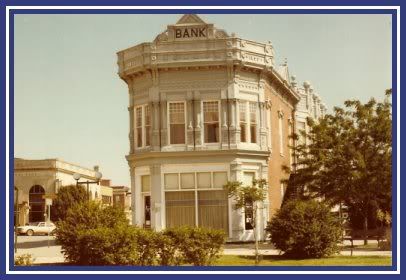
Condon Bank Today |
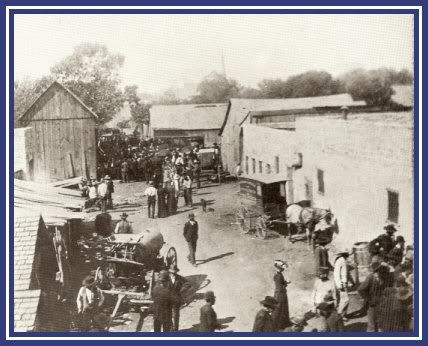
Death Valley |
Northeast of the Condon Bank stands the Coffeyville Defender's Museum which houses artifacts from the raid. These include the outlaw's guns, saddles, and cartridge belts, but the greatest reminder for me in the museum, is a giant wall-sized photograph of The Daltons laying dead in a row in Death Alley. Above the photograph in big letters, once stated by Emmett Dalton, and probably many other criminals from history, reads the following words:
"CRIME DOESN'T PAY!"
|












